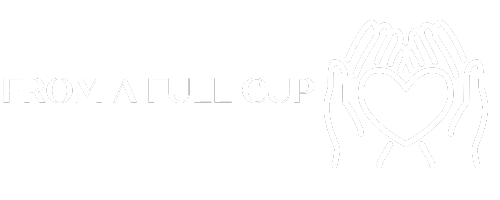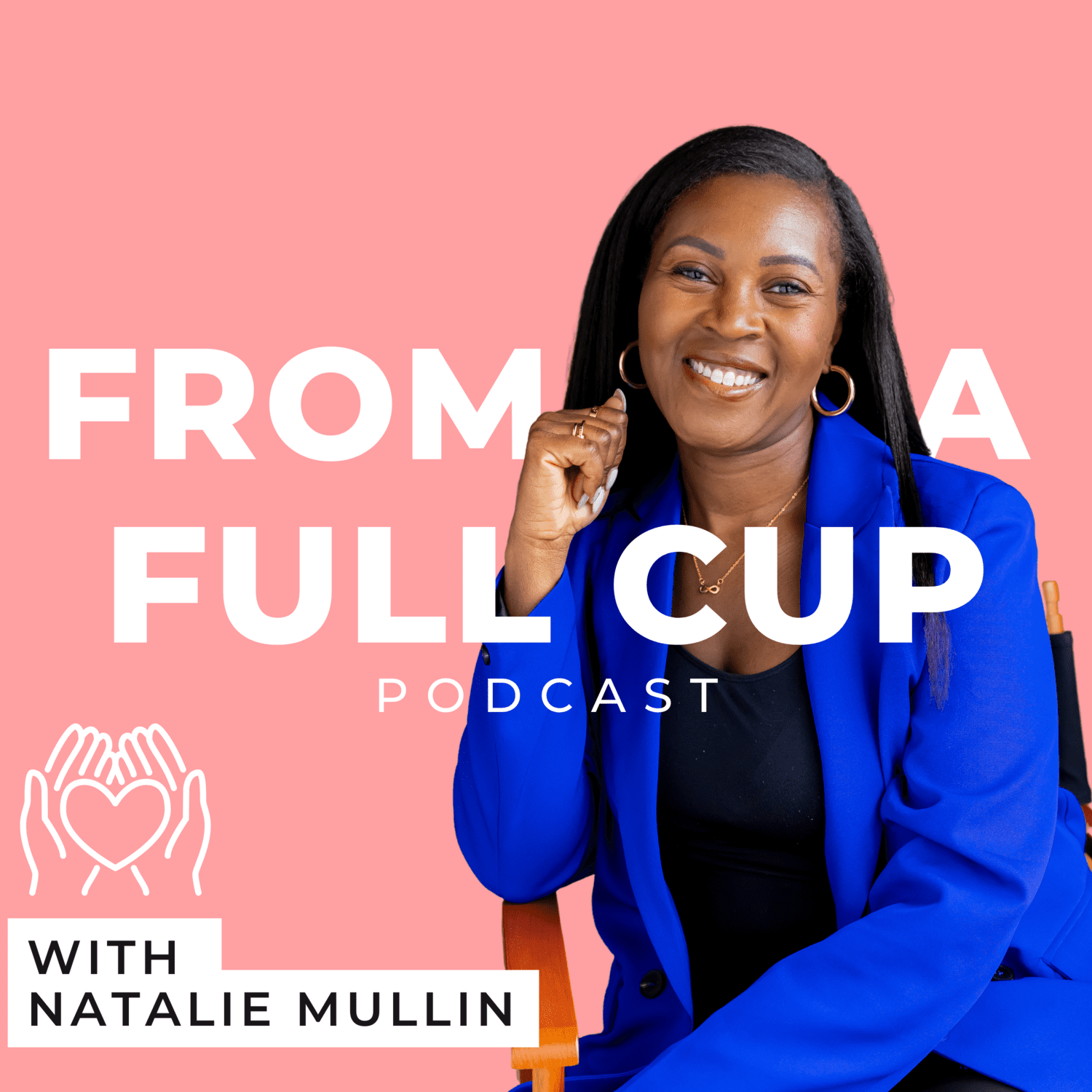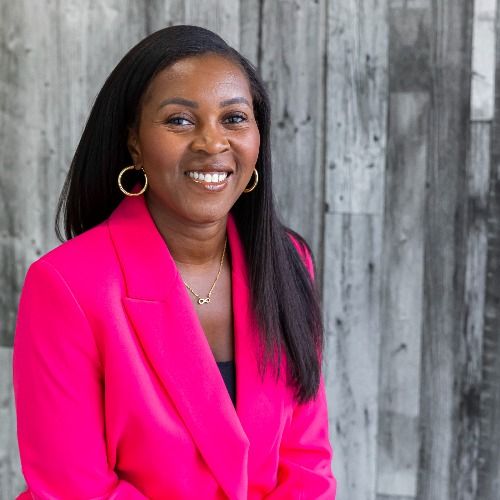S2.E5. Navigating Stress and Anxiety with Neesha B
On today's episode, we welcome stress and anxiety coach Neesha B to discuss the unique obstacles and stressors women and teen girls face and offers practical strategies to keep stress and anxiety in check.
In this episode we discuss:
-why we need to understand our stress triggers, not just know they exist
-the difference between healthy and unhealthy stress
-Neesha's personal journey of learning to deal with stress and why her children were her biggest motivators
-the 3N's strategy to combat stress every time
-the first step we should take when working on our mindset
Timestamps:
00:00 Introduction to the Guest and the Topic
00:40 Opening Segment: This Filled My Cup
01:47 Understanding Stress and Anxiety
04:07 Strategies to Manage Stress and Anxiety
07:08 Common Triggers of Stress and Anxiety
10:18 Personal Experiences with Stress and Anxiety
19:09 Dealing with Stress and Anxiety in Teenagers
23:14 Rapid Fire Questions
24:55 Final Thoughts
Links:
This podcast is hosted by Captivate, try it yourself for free.
Disclaimer:
This podcast includes affiliate links that, when clicked and purchased, may generate revenue for me and the podcast. I only recommend things I truly love and stand behind.
Download Free Wellness Assessment:
https://from-a-full-cup.ck.page/93236e5b48
Book Free wellness Breakthrough Session:
https://tidycal.com/nataliemullin/free-discovery-call
Get in touch:
Speaker Bookings:
From a Full Cup is a mental wellness education podcast that teaches women to prioritize their wellness and put themselves first, because you can’t pour from an empty cup.
I'm your host Natalie Mullin , Certified Wellness Educator, Speaker, Facilitator and Teacher. Every Thursday I release a new episode, teaching women how to dream big, take action and move the needle forward in life.
Past episodes
Subscribe to the podcast
Copyright 2025 Natalie Mullin
Transcript
[00:00:22] Natalie: Hi everyone and welcome back to another episode of From a Full Cup. Neesha B is a stress and anxiety coach and we're going to be talking about how stress and anxiety can really impact our mindset as one of the pillars of wellness. So Nisha, welcome to the show.
[:[00:00:40] Natalie: Nisha, I always like to start with our opening segment, which is This
[:[00:00:50] Neesha: Yeah, I was listening to your, um, the first episode of season two and I really liked the reminders that you had in there for us.
[:[00:01:21] Neesha: And I think that if we were thinking more in terms of what's good for us, we wouldn't be bragging about that. We'd be more focused on getting enough sleep because it's what we need for our brain and our body. And then gratitude. I just find gratitude so healing and it's always good to be reminded that there are even just very simple things in life.
[:[00:01:41] Natalie: Absolutely. Thank you so much for sharing that. And I'm glad that those were able to fill your cup.
[:[00:01:47] Natalie: Nisha, I want to just dig right in, and I want to talk about stress
[:[00:01:55] Neesha: Well, you know, healthy stress and worries to a certain extent, those normal levels help us to focus on what we need to get done and then when the stressors go away, you know, there can be internal stressors or external stressors.
[:[00:02:31] Neesha: And I was also able to, you know, tell myself, well, I'm anxious right now, but once I'm there I'll be fine and the anxiety will pass. Right? Anxiety that is more disordered, that tends to linger and it can shut us down and it doesn't motivate us. We, it can lead us into avoidance or suppression.
[:[00:03:04] Natalie: So think about if you never felt a need to actually go look for food or like even just something like the very primal instincts or to move when there's danger or things like that. If we didn't have those spikes of cortisol that would impact our stress level to realize, no, this is something you need to prioritize right now.
[:[00:03:42] Neesha: You know I also work with teen girls and one of the things I immediately start to them about is that, you know, that we do need a certain amount of stress and worry in our lives in order to, to get things done. But if we're feeling so overwhelmed by stress or anxiety, it can shut us down and then that's a sign that we need to get some
[:[00:04:07] Natalie: And so when people are feeling very stressed or anxious, are there different strategies that you would recommend for, for either one?
[:[00:04:28] Neesha: So I know it sounds really, simple and basic sometimes, but we do need to be making sure that we're getting enough sleep. We do need to be making sure that we're nourishing our body and our mind with good food and healthy food. We need to make sure that we are going for walks, getting fresh air, getting enough exercise, that kind of thing.
[:[00:05:15] Neesha: And then once you identify what kind of reactions you have, then that's when you can start thinking about, well, how can I manage that? Right? does it mean that I, am I shutting down because I'm just finding it so overwhelming that I can't deal with it? And if I'm shutting down, why is that? I find that sometimes people are really hard on themselves.
[:[00:06:04] Neesha: You know, this is hard. This is hard. It's normal to find it difficult. And what steps do, what steps can I take next? What's the first step? What's the second step? Um, you know, sometimes we have to break things down into, bite sized chunks, right? And then once we've broken it down into bite sized chunks, then we can start, , moving along. But first we have to, you know, build some awareness around what is overwhelming us and how we react to that.
[:[00:06:55] Natalie: And so if you're doing mindfulness in the morning, but you woke up very peaceful, it's not going to be as impactful to you in a stressful moment, if you haven't identified when is that stressful moment that I can then pull out that tool. Maybe we can talk to the listeners about what are some of the things that you see in society that are common triggers of stress or common roots of stress and anxiety that people might not even be aware of because they just accept it as a part of their normal day to day practice.
[:[00:07:47] Neesha: I, that's another example of us being really hard on ourselves and thinking that we can have no impact. So, you know, I was a teacher, and when you're a teacher, you are working within a system, and there are lots of people Who make decisions that you have no control over, but as a teacher there are things that you do have control over, right?
[:[00:08:34] Natalie: I think that idea of what you can and can't control is so important and just accepting that. So accepting this is out of my control, so I'm just gonna leave it alone. This is in my control and now I'm going to be proactive and take strategies. And it's funny because when I think about what are different stressors that people go through.
[:[00:09:11] Natalie: She's like, every parent goes through parental stress. And I wasn't even thinking like that could be a source of stress, but I was like, well, you know when he is having a tantrum in the middle of the mall, yeah, that can definitely be a stressful moment. But I had not identified it for myself as a stressful moment.
[:[00:09:51] Natalie: So I'm curious, any other experiences, maybe even from your own personal life, like things that have been triggers for you to bring on either stress and anxiety. You already shared one, which might be coming on a podcast, right? A lot of people face public speaking as, as a source of stress or anxiety.
[:[00:10:18] Neesha: Well, you know, to your point about, um, not being aware that something is causing you stress. I think that I was living like that for a while myself and I started to notice that I was being short tempered with my kids, right?
[:[00:11:12] Neesha: And so. It kind of built up over over some time. And then COVID kind of brought it all to a head, right? I started, I started thinking, is this who I really want to be? This kind of always, angry, somewhat resentful person who gets angry easily over
[:[00:11:58] Neesha: and based on the fact that I was short tempered and that I didn't want to be that way around my family. I realized that I needed to be more healthy. I needed to protect my family, take care of my family, but I still wanted to be able to have
[:[00:12:32] Neesha: And that's why I started to learn how to become a coach. Is why I started learning a lot more about acceptance and commitment coaching, which is the type of coaching that I practice. And I started thinking what are the tools that I want to be able to not just use for myself, but also use with my kids or to teach them how to use?
[:[00:13:09] Natalie: I think that's so important. This idea of just becoming self aware of what do you want and not want and I also come from a teaching background and I think a lot of times and I've spoken about this on the podcast before but a lot of times, especially if you're in a career where you're serving others, so it's an impact career such as teaching, such as nursing, anything in healthcare, social work, those kinds of professions, it's really hard sometimes, For people to consider alternative options because they want to make that positive impact and that positive impact that they make it helps them to feel fulfillment. So there's a lot of times this fear, like if I leave this role, I'm not going to feel fulfilled anymore, or I'm not reaching my potential, or I'm kind of turning my back on who I was committed to, which in our case was our students.
[:[00:14:20] Natalie: So if you're in a role where you're no longer happy, even though you're making an impact it's kind of an inner conflict in yourself, right? Because you just don't feel that's the right choice for you at the moment you don't feel aligned. And alignment is something that's so important, it's something I talk about all the time on the podcast.
[:[00:15:04] Natalie: Of course, we always know that people are stressed about relationships or, you know what, I shouldn't say always, but it's an, it's a common source of stress, not just romantic relationships, but with family members, right? We hear so many stories about people saying, I no longer speak to my mom, or I've cut my dad off, or my siblings and I don't talk, right?
[:[00:15:47] Natalie: So if you have a family member that becomes ill or something like that can become very stressful for you trying to it. To help that family member or just to even process it. Even life transitions so if you are moving to a new place, or you are moving to a new role, a new company, or you had a baby, or you go through a divorce, or you just get married, like, all of these things, they could be positive, right?
[:[00:16:36] Natalie: I know you shared a few before. I don't know if you have any more, but I'm effective techniques and exercises that you kind of use with your clients to help them cope with acute moments of stress and anxiety.
[:[00:16:57] Neesha: Right. And just really slowing down in moments. I think sometimes we're in always such a rush. It's a hard thing to do. It really takes practice, but to slow down and take a pause, take a beat before reacting. Right. Just, just slow down. There's that moment between identifying a trigger and then reacting to it. And I think that if we can create some space between the trigger and the reaction, that is the most important moment. Just slow down, take a pause, notice what the trigger is and then notice how you normally want to react and how you can react differently, right? So if your kid normally, interrupts you and you hate it when they interrupt you. So instead of telling them off in that moment, just pause, you know, and say to yourself, normally I want to tell her off.
[:[00:18:23] Neesha: Because a lot of the time in the moment when we experience a trigger and react too quickly, we often regret it, right? Or we wish that we could have done something differently. So I think generally like a big first step is to just take that pause and notice how you want to react. In acceptance of commitment coaching
[:[00:18:51] Neesha: It's normal for me to be frustrated. It's normal for me to be angry. Um, but I don't have to.
[:[00:19:19] Natalie: debilitating stress amongst teenagers, that they don't even want to go to school, they don't want to participate, and a lot of this kind of came out of COVID.
[:[00:19:47] Natalie: But for parents who are looking to kind of support their teens kind of going through this phase, what is Some advice maybe you can give them or things that you've kind of noticed from your own practice and work with this population.
[:[00:20:06] Neesha: And to give them some space, some grace, right? Um, because, you know, if we have trouble, Handling difficult situations as adults, why would we expect teenagers or children to be able to handle difficult situations? Right? So I think that's an important distinction to make to ourselves.
[:[00:20:50] Neesha: Right. And then also ourselves, you know, we need to also give ourselves some. Some space to realize that it's normal for us to get to be upset or to get annoyed or whatever like that's part of life that sometimes other people's behaviors.
[:[00:21:28] Natalie: I think leading from that place can be so powerful and then Really, it's a journey, and it's a journey of all parties involved, right?
[:[00:22:11] Neesha: The thing that can be the most motivating is knowing what our purpose is, what is our why? And sometimes the way to figure out what our why is, is to take a look at the people in our lives, take a look at the things that we're doing in our life, thinking about how we've handled situations in the past and maybe might have wanted to handle things differently, considering who do we want to be, really taking the time to To dig into that, and then once we have a sense of what it is that's important to us, what our values are, then we can start moving in the direction of our purpose.
[:[00:22:57] Natalie: And I'm really hearing there about intention, right? Once you know your why, then it's about being intentional with the options. and behaviors that you do to support the why. Um, so that is really powerful. Nisha, thank you for everything you shared today.
[:[00:23:14] Natalie: We're gonna move into our next segment, which is rapid fire.
[:[00:23:20] Neesha: First job. Um, it was in the back of a, um, tax preparation service. I was, um, I was hired by my dad to staple things together. Basically 11 years old.
[:[00:23:40] Natalie: a first job. You were the staple
[:[00:23:47] Natalie: Okay. What is the best book you've ever read? Oh, and I know this might be hard.
[:[00:24:04] Neesha: Viktor Frankl, he was in a, uh, concentration camp and it's all about how he survived the concentration camp. And it had a big impact on me because that's where he talked about having purpose. One of the reasons why he survived is because he had a purpose.
[:[00:24:27] Natalie: I think that's really powerful. Is it called, Man's Search for Meaning? That's it. Yeah.
[:[00:24:36] Neesha: Spending time with my kids.
[:[00:24:44] Natalie: What's your version of a healthy life?
[:[00:24:51] Natalie: Nisha, this has been such a great conversation. Thank you for everything you've shared with the listeners.
[:[00:25:02] Neesha: I have a website that's easy to access. It's NishaBeeCoaching. com, anybody can send me an email at info at NishaBeeCoaching. com. I'm also on LinkedIn, uh, as NishaBee
[:[00:25:43] Neesha: I really like to work with teen girls because it's tough being a teen girl and there are so many expectations perfection is expected from kids that we don't realize that that's what we're putting on teen girls in particular, so many expectations.
[:[00:26:07] Natalie: That program sounds amazing. I was reading some of the reviews on your website about that, and it seems like you're really making an impact not just for the girls, but even for their moms who are enrolling them in these programs, too.
[:


